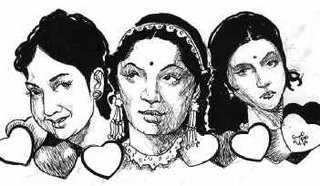HEROINES OF THE PAST

Heroines of the past were certainly more modern.
I saw a film when I was a youngster that impressed me very much. `Mangamma Sabatham' (1946) made by Gemini Studios and starring Vasundhara Devi (Vyjayanthimala's mother) and Ranjan was a great hit and ran for one and a half years in a Madurai theatre.
Those days Gemini films were mostly based on folk tales, and so had rather far-fetched stories. But the values propagated in them were more relevant and modern than those in films today. Moreover the heroine had equal, if not greater, importance than the hero.
A tale of true grit
Mangamma belongs to a place where people live in constant fear of the lecherous prince of the kingdom who preys on women ruthlessly. So women hide in their houses whenever he passes by. Mangamma goes looking for her dove in the palace grounds, and is spotted by the prince, who immediately is smitten by her beauty and makes overtures. Mangamma pushes him away and makes good her escape.
Later, he tries to meet her again, and gets rebuffed once more. Enraged, the prince makes a vow that he would marry her, lock her up in a distant mansion and deprive her of marital bliss (vaazhaavetti) for the rest of her life. Mangamma vows that she would marry him, have a son by him, and make the son whip him in public. That is the basic premise of the story. How Mangamma makes good her promise forms the rest of the film.
She ingeniously tricks the prince and has a son by him. She achieves her vow when the son grows up and is ready to whip the roguish prince. The townsfolk gathered in large numbers wait to watch the prince get his comeuppance. But Mangamma appears on the scene to stop her husband being humiliated, thus showing magnanimity in victory. And then they all live happily ever after, presumably.
Though the story is a bit unbelievable, the message gets carried through. The point that is being made is that a woman, however low her origins may be, can overcome the powerful male chauvinists on her own. Mangamma never asks for help from anyone. She manages splendidly all by herself.
Two more go-getters
Gemini Studios also made `Chandralekha' (1948) where the heroine faces overwhelming odds, but finally defeats the immoral schemes of the villain (Ranjan again) to live happily with her lover (M. K. Radha). Incidentally, the film had as a climax the longest and most thrilling sword fight in the history of films. There was a feeling that this fight might have been influenced by `Scaramouche,' which had the longest sword fight in the history of Hollywood - seven minutes. But `Chandralekha' was made three years before `Scaramouche.'
Chandralekha single-handedly thwarts the nefarious designs of the prince, saves her lover from a cave, devises a scheme to bring in an army in drums, like the Trojan horse, and wins in the end.
All Gemini films were noted for their spectacular sets, galloping cavalries, thrilling duels and so on. But the determination and resourcefulness of the heroine is never lost sight of.
Vijaya-Vauhini's `Missiamma' (1955) has the heroine going boldly to a village with a young man, pretending to be his wife in order to get jobs as teachers.
"I will come with you to the village, but you must assure me you will not take advantage of the situation," says the heroine. "Of course," says the young man (Gemini Ganesh). "Would you like to see my conduct certificate?" Anyway, the heroine manages things without losing her virtue or self-respect. Savithri, perhaps the subtlest actress in the country at that time, played the title role.
Delicate dolls
Today's heroines are bold only in the way they dress and the way they dance. But the moment some danger crosses their path, they become helpless, wringing their hands and calling for help. (Kaapaathunga!). Only the hero has to do all the work and save the helpless darling. With Women's Lib and equal rights and so on, this kind of heroine seems incongruous in our times.
The heroines of the past were certainly more modern.
J. VASANTHAN
© Copyright 2000 - 2006 The Hindu

4 Comments:
The male of the species whose bastions have all fallen maybe likes to live in a fantasy world in films rescuing damsels in distress who cannot fend for themselves. In the liberated world where women are financially secure and equal to any challenge it is often the men who need help. Looking forward to more such write-ups on new films
Makes one nostalgic for a more innocent age. Watching or reading about films you saw as a child or a teenager makes you feel young. Let's have more articles in this vein
great writing Sir! Your English is very good and your expressions are very elegant. Thank you.
To The Masillamanis. Thank you for your appreciation. Best wishes, JV
Post a Comment
<< Home